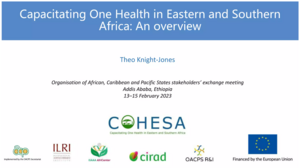
Antimicrobial resistance in Africa—How to relieve the burden on family farmers
Abstract
Although currently available data indicate that Africa has the lowest usage of antimicrobials in animals in the world (adjusted by animal biomass), data show a high prevalence of antimicrobial resistance in foodborne pathogens isolated from animals and animal products. Apart from the lack of solid data on antimicrobial use in many countries in Africa, different hypotheses could explain this situation. Qualitative interviews of farmers show a lack of knowledge and uninformed use of antimicrobials. Considering the development of animal farming to meet an increasing demand for proteins, this deficiency represents a serious public health issue. We advocate for policies that consider the specific challenges faced by family farmers in Africa, to simultaneously improve access to veterinary drugs while strengthening the regulation of their use. We propose a global approach targeting the agri-food system, offering innovative social and technical interventions on antimicrobial usage, adapted to family farmers.
Citation
Ducrot, C., Hobeika, A., Lienhardt, C., Wieland, B., Dehays, C., Delabouglise, A., Bordier, M., Goutard, F., Patel, E., Figuié, M., Peyre, M., Moodley, A. and Roger, F. 2021. Antimicrobial resistance in Africa—How to relieve the burden on family farmers. Emerging Infectious Diseases 27(10): 2515–2520.










